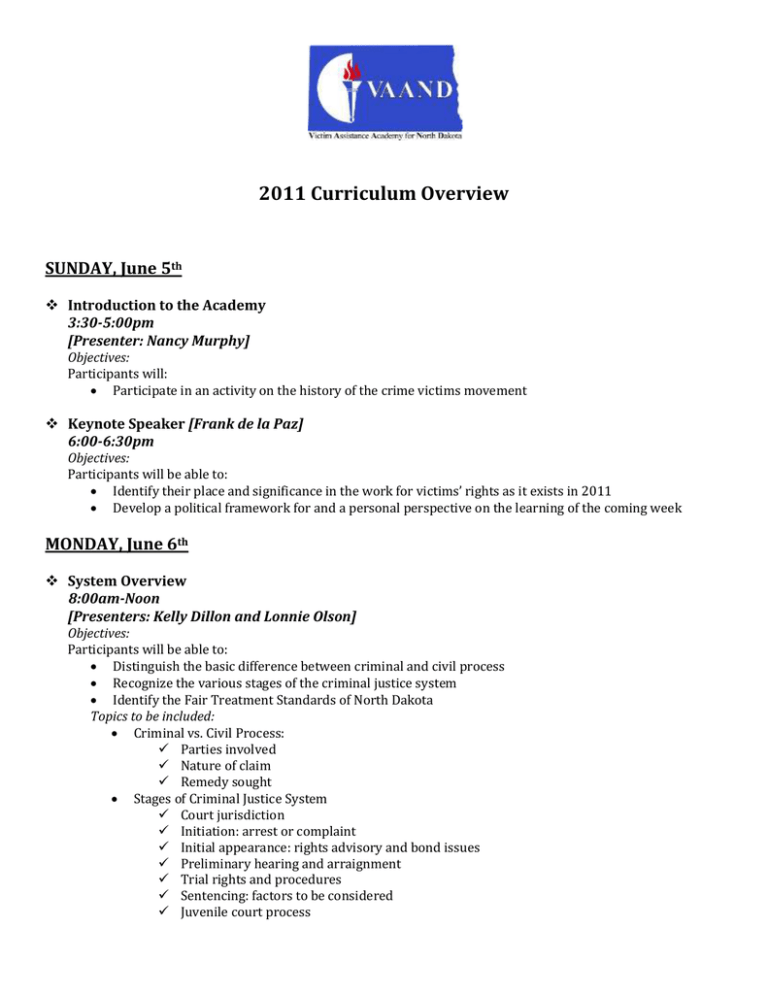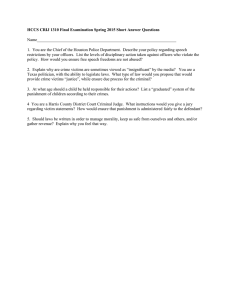
2011 Curriculum Overview
SUNDAY, June 5th
Introduction to the Academy
3:30-5:00pm
[Presenter: Nancy Murphy]
Objectives:
Participants will:
Participate in an activity on the history of the crime victims movement
Keynote Speaker [Frank de la Paz]
6:00-6:30pm
Objectives:
Participants will be able to:
Identify their place and significance in the work for victims’ rights as it exists in 2011
Develop a political framework for and a personal perspective on the learning of the coming week
MONDAY, June 6th
System Overview
8:00am-Noon
[Presenters: Kelly Dillon and Lonnie Olson]
Objectives:
Participants will be able to:
Distinguish the basic difference between criminal and civil process
Recognize the various stages of the criminal justice system
Identify the Fair Treatment Standards of North Dakota
Topics to be included:
Criminal vs. Civil Process:
Parties involved
Nature of claim
Remedy sought
Stages of Criminal Justice System
Court jurisdiction
Initiation: arrest or complaint
Initial appearance: rights advisory and bond issues
Preliminary hearing and arraignment
Trial rights and procedures
Sentencing: factors to be considered
Juvenile court process
Fair Treatment of Victims and Witnesses
Statutory rights
Considerations for child victims and witnesses
Post-trial rights
Victim responsibilities
Collaboration
1:00-3:00pm
[Presenters: Kari Kerr, Nancy Murphy and Amy Vorachek]
Objectives:
Participants will be able to:
Discuss how to make an effective referral network
Describe ways to establish and maintain relationships with referral agencies
Develop a list of referral services
Understand the purpose of the Statewide Automated Victim Information & Notification Service (SAVIN)
and how to access the system
Topics to be included:
When and where to make referrals
Identify potential partners in the community and professional networks
Cooperation with other agencies and limitations
Negotiation and collaboration case examples
Basic Advocacy Skills and Crisis Intervention
3:15-4:30pm
[Presenter: Linda Isakson and Nancy Murphy]
Objectives:
Participants will be able to:
Identify basic principles of effective communication
Develop strategies to enhance both verbal and non-verbal communication
Identify characteristic responses to a crisis
Explain the steps to helping someone in crisis
Topics to be included:
Listening and oral communication
Crisis Intervention:
Assessment
Stages of crisis
Safety for staff and victims
TUESDAY, June 7th
Financial Crimes
8:00-9:15am
[Presenter: Steve Kukowski]
Objectives:
Participants will be able to:
Define the difference between property and financial crime
Identify the emotional needs of victims of property and financial crimes
Identify resources for assisting victims of property and financial crimes
Topics to be included:
Credit reports (importance of checking your credit report)
Types of property and financial crime
Domestic Violence
9:30-11:30am
[Presenters: Kari Kerr and Kelly McLean]
Objectives:
Participants will be able to:
Describe the legal definitions of domestic violence and strangulation
List and discuss the differences that distinguish domestic violence from other crimes
Identify and practice approaches for working with victims of domestic violence
Topics to be included:
Dynamics
Lethality
Protection Order vs. Disorderly Conduct Restraining Order vs. No Contact Orders
Key components of a safety plan
Self defense and predominant aggressor
Offender treatment
Stalking and Technology Safety
12:30-2:15pm
[Presenters: Kari Kerr, Kelly McLean, and Dana Mees]
Objectives:
Participants will be able to:
Describe the legal definition of stalking
Identify approaches for working with victims of stalking
Identify technology safety for victims
Topics to be included:
Dynamics
Lethality
Key components of a safety plan
Sexual Assault
2:30-4:30pm
[Presenters: Shelly Carlson, Darren Dyke, and Jane Ell]
Objectives:
Participants will be able to:
Describe the legal definition of sexual assault
Identify and practice approaches for working with victims of sexual assault
Define the roles of Law Enforcement, Advocacy and Sexual Assault Nurse Examiner (SANE) during a
joint victim interview
Topics to be included:
Issues of consent
Dynamics
Evidence collection (including the rape kit)
Sexual Assault Nurse Examiner (SANE) – brief overview
Victim Panel
7:00-8:30pm
[Facilitator: Linda Isakson]
Topics to be included:
Personal experiences of each crime victim
Helpful responses from the system
WEDNESDAY, June 8th
Victimization in the Aging Population
8:00-10:15am
[Presenters: Shelly Carlson and Jim Jacobson]
Objectives:
Participants will be able to:
Describe the importance of addressing issues specific to crimes involving elderly victims
Identify specific resources for assisting victims
Topics to be included:
Elderly
Referrals
Confidentiality in Crime Victim Services
10:30am-Noon
[Presenter: Brad Peterson]
Objectives:
Participants will be able to:
Identify which confidential client information can be shared with others
Topics to be included:
Confidentiality vs. privileged information
Privacy laws regarding identifying information (i.e., names, addresses, etc.)
Child Victimization
1:00-4:30pm
[Presenters: Laurie Gotvaslee and Shannon Hilfer]
Objectives:
Participants will be able to:
Recognize what child abuse is
Develop the ability to complete a child abuse/neglect report (960)
Identify approaches for working with victims of child abuse and child neglect and their families
Topics to be included:
Child abuse reporting process - 960
Child supervision guidelines
Role of the Children’s Advocacy Center
Testifying in Court
THURSDAY, June 9th
Building Relationships with the Native American Victims of Crime
8:00-9:45am
[Presenter: Linda Thompson]
Objectives:
Participants will be able to:
Recognize the need for culturally appropriate actions based on the historical perspective of Native
American populations
Identify service systems and delivery methods available to Native American populations
Identify culturally sensitive communication methods and techniques for Native American outreach
efforts
Apply effective strategies and messaging for working with Native American populations
Topics to be included:
Recognizing personal bias
Crime in Indian Country
Immigrant and Refugee Victims of Crime
10:00-11:30am
[Presenter: Kathy Smith]
Objectives:
Participants will be able to:
Identify the unique needs of immigrant victims of crime
Identify the unique dynamics of intimate partner violence when the victim is an immigrant
Identify appropriate and recommended advocacy services for immigrant victims of crime
Identify special protections under current immigration laws for victims of crime
Topics to be included:
Identify different ethnic groups within the community
Immigration law as it relates to victims of crime (brief overview)
Working With People With Disabilities
12:30-2:15pm
[Presenter: Martha Tollefson]
Objectives:
Participants will be able to:
Describe the needs of individuals with disabilities
Identify resources for victims with disabilities
Identify resources to assist in working with people with disabilities
Topic to be included:
Referral agencies
Bias Crimes Against Gay, Lesbian, Bisexual, Transgender, and Questioning Persons (GLBTQ)
2:30-4:30pm
[Presenter: Bruce Reeves]
Objectives:
Participants will be able to:
Explain the GLBTQ Community’s commonalities and differences
Describe the importance of addressing issues specific to bias crimes
Topics to be included:
Gay, Lesbian, Bisexual, Transgender, and Questioning (GLBTQ)
Referrals
“In Her Shoes” Exercise
7:00-8:30pm
[Facilitator: Desiree Uhrich]
Goals of the exercise:
To increase awareness of the struggles that women with abusive partners face
To illustrate that domestic violence is a community tragedy, not a private problem
To show that society has a role in the movement to end domestic violence
To encourage everyone to think creatively about the ways we can work to end domestic violence
FRIDAY, June 10th
Recognizing the Effects of Trauma
8:00-9:15am
[Presenter: Joan Halvorson]
Objectives:
Participants will be able to:
Identify the elements of vicarious trauma
Identify signs of compassion fatigue (burn out)
Financial Assistance for Crime Victims
9:30-10:30am
[Presenter: Joan Halvorson]
Objectives:
Participants will be able to:
Identify financial resources for crime victims
Topics to be included:
Crime victims compensation
Restitution
Cleaning of crime scenes

